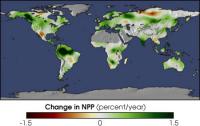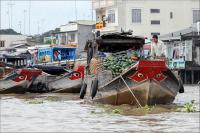-
Trump-owned resort cites sea level rise in application for seawall permit
Donald Trump may believe that the scientific evidence about global warming is a “hoax,” or the result of a Chinese plot to undermine the American economy, but the professional managers of his coastal properties believe that global warming is real, and that one of its consequences – sea level rise – poses a real threat to the Trump properties they manage.
-
-
Changing land uses in California will drive water needs beyond available supply
If past patterns of California land-use change continue, projected water needs by the year 2062 will increase beyond current supply. If historical trends of land use changes to or from urban, agricultural or other uses continue, the result will be increased water-use demand beyond what existing supplies can provide. Large uncertainties associated with weather and climate variability have the potential to exacerbate the problem.
-
-
Frequency of extreme heat waves on the increase in Africa -- could soon occur annually

Climate analysis shows that periods of unusually hot weather are on the rise for one of the most vulnerable continents to climate change, even if the increase in global average temperature remains at a modest level.Longer, hotter, more regular heat waves could have a damaging effect on life expectancy and crop production in Africa warn climate say scientists.
-
-
With drought easing, California rolls back water conservation rules
California announced on Wednesday that it was rolling back mandatory water conservation rules which were put in place at the height of a 4-year drought. The decision to roll back the restrictions came after water conditions in many parts of the state have improved as a result of a wet winter.
-
-
Maryland identifies health vulnerabilities resulting from climate change
As world leaders convened in Washington, D.C. a couple of weeks ago for the Climate Action 2016 summit, a new report by Maryland public health leaders details the impacts of climate change on the health of Marylanders now and in the future. The report examines the relationship between exposure to extreme weather events and risk of selected health outcomes including food and waterborne illnesses, hospitalization for heart attacks and asthma, and motor vehicle accidents.
-
-
Cybersecurity cracks the undergraduate curriculum
In a time when million-dollar security breaches of household name corporations regularly make headlines and complicate lives, computer science undergraduates at America’s universities remain surprisingly underexposed to basic cybersecurity tactics. the Software Assurance Marketplace (SWAMP), a national cybersecurity facility housed at the Morgridge Institute for Research in Madison, Wisconsin, has been working to address this skills gap by offering a suite of software security tools that Bowie State has been integrating into undergraduate coding courses, giving students a way to examine and rid their code of security weaknesses.
-
-
Trend continues: April 2016 the seventh consecutive warmest month on record
April 2016 was the warmest April on record for the globe, according to NASA. every month from October 2015 to April 2016 has now been warmer by 1 degree Celsius or more above the 1951-1980 average. Parts of Alaska, Russia, western Greenland, and northern Africa had a temperature deviation of at least 4 degrees Celsius above the April average.
-
-
Floods, coastal erosion may expose contents of UK landfills
The contents of historic coastal landfill sites in England and Wales could pose a significant environmental threat if they erode, according to a new study. The main risks to these landfills come from the effects of climate change, including erosion and flooding with salt water from storm surges and higher water levels.
-
-
Sea-level rise has claimed five whole islands in the Pacific: first scientific evidence
Sea-level rise, erosion, and coastal flooding are some of the greatest challenges facing humanity from climate change. Recently at least five reef islands in the remote Solomon Islands have been lost completely to sea-level rise and coastal erosion, and a further six islands have been severely eroded. This is the first scientific evidence that confirms the numerous anecdotal accounts from across the Pacific of the dramatic impacts of climate change on coastlines and people.
-
-
Climate-driven water scarcity could reduce economic growth by up to 6%: World Bank
Water scarcity, exacerbated by climate change, could cost some regions up to 6 percent of their GDP, spur migration, and spark conflict, according to a new World Bank report released the other day. The report says the combined effects of growing populations, rising incomes, and expanding cities will see demand for water rising exponentially, while supply becomes more erratic and uncertain.
-
-
Climate-exodus expected as temperatures rise in Middle East, North Africa
More than 500 million people live in the Middle East and North Africa — a region which is very hot in summer and where climate change is already evident. The temperature during summer in the already very hot Middle East and North Africa will increase more than two times faster compared to the average global warming. This means that during hot days temperatures south of the Mediterranean will reach around 46 degrees Celsius (approximately 114 degrees Fahrenheit) by mid-century. As a result, the number of climate refugees could increase dramatically in future.
-
-
A rising tide of migration
“With sea levels on the rise, several island nations are scrambling to stay above water and ensure citizens will have a place to go when the ocean engulfs their homeland. The humanitarian-crisis phase of climate change has officially begun” – these are the opening sentences of an article just published in the Columbia Law School Magazine.
-
-
CO2 fertilization is greening the Earth

A new, comprehensive study shows a significant greening of a quarter to one-half of the Earth’s vegetated lands. The greening represents an increase in leaves on plants and trees. Green leaves produce sugars using energy in the sunlight to mix carbon dioxide (CO2) drawn in from the air with water and nutrients pumped in from the ground.
-
-
Putting consistent value on experts' uncertainty on climate change models
Science can flourish when experts disagree, but in the governmental realm uncertainty can lead to inadequate policy and preparedness. When it comes to climate change, it can be OK for computational models to differ on what future sea levels will be. The same flexibility does not exist for determining the height of a seawall needed to protect people from devastating floods. For the first time in the climate field, researchers have combined two techniques long used in fields where uncertainty is coupled with a crucial need for accurate risk-assessment — such as nuclear energy — in order to bridge the gap between projections of Earth’s future climate and the need to prepare for it.
-
-
Rising seas put Vietnam in the “bull’s eye” of rising seas

A rising sea level — for a country like Vietnam, with 2,000 miles of coastline — presents a major environmental and food security challenge, especially in the Mekong River Delta region where 22 percent of the population lives and about half of the country’s food is produced.
-
More headlines
The long view
How Climate Change Will Affect Conflict and U.S. Military Operations
“People talk about climate change as a threat multiplier,” said Karen Sudkamp, an associate director of the Infrastructure, Immigration, and Security Operations Program within the RAND Homeland Security Research Division. “But at what point do we need to start talking about the threat multiplier actually becoming a significant threat all its own?”
